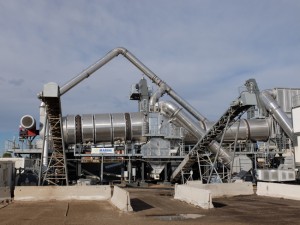Marini’s asphalt batching production innovation
First published in bauma Preview - March 12, 2019
Marini is introducing a sophisticated batching plant able to use a feed containing up to 100% recycled asphalt pavement (RAP). The innovative Master Tower is said to feature technology that is completely different from existing plant designs.
This batch plant has its two drums mounted end to end. The first drum is for drying the virgin aggregates and is heated by a burner. An internal tube carries the heat through the virgin aggregate drum, ending before it reached the end of the drum. Hot gases then circulate through the drum before passing through heat exchange systems to the second drum, where the RAP is added. This design avoids direct heating of the bitumen, so there is no risk of this being burned off. The plant can use a mix of virgin materials plus RAP, or produce mixes from RAP only.
Simulations have helped understand the way materials behave in the drum. The location and spacing of the flights inside the aggregates drum and the RAP drum was modelled so as to optimise material flow and to ensure the materials received the most efficient heat distribution. Bologna University helped with the study for the flight positioning, as well as assisting in evaluating the temperatures recorded by the sensors inside the plant.
Heat from the first drum is said to be transferred efficiently to the second drum, allowing the RAP to be heated effectively. Meanwhile, insulated piping from the end of the second drum then reroutes remaining heat back to the first drum, further increasing overall efficiency. Both drums are heavily insulated to retain heat and reduce losses in the system.
Because the plant relies on a single burner only, it requires less maintenance but perhaps more importantly, it also uses 30% less fuel than a plant with a similar output that features twin burners.
Another key feature of the Master Tower is its filtration system, which is designed to minimise dust emissions. According to Marini, this plant has amongst the lowest emissions of any asphalt production facility yet built, easily meeting existing requirements.
The control system is crucial to the new plant. The sophisticated software allows the user to switch recipes from batch to batch.
Companies in this article
Marini
Product Launch Videos
Most popular news
- Fayat’s forward view – at bauma 2019
April 16, 2019 - Hitachi’s ZX65USB-6 mini excavator works harder with less fuel
April 15, 2019 - Komatsu boost fuel efficiency with its WA475-10 wheel loader
April 15, 2019 - Smiley Monroe launches conveyor belt page turner at bauma 2019
April 12, 2019 - Topcon’s sophisticated head-up display goes on show at bauma 2019
April 12, 2019 - Liebherr’s innovative piling rigs at bauma 2019
April 12, 2019












